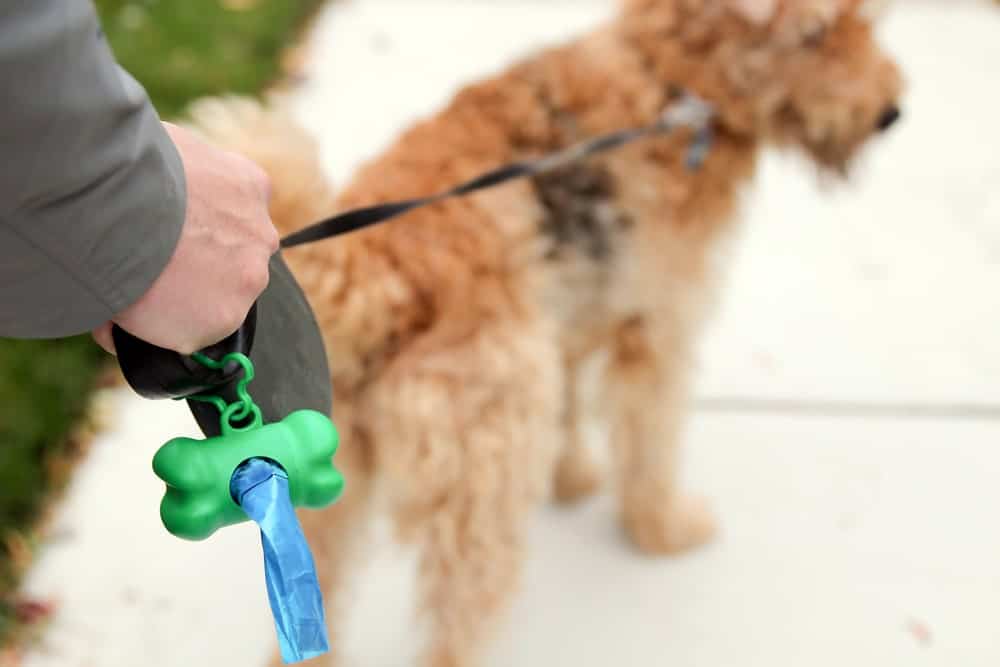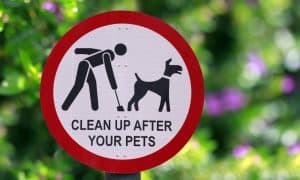“This post contains affiliate links, and I will be compensated if you make a purchase after clicking on my links.”
By Annaliese Olson
You race out your front door, across the lawn to your car. Your foot slips and you realize you stepped in poop. Now your day is delayed by a change of shoes because, if you don’t put on clean footwear, that toxic waste and its odor will follow you to work. Darn the neighbor’s dog!
The chances of stepping in poop are pretty good. An estimated 40% of dog owners don’t pick up their pets’ waste. Catch them in the act, well, non-act, and they might say they’re doing you a favor, fertilizing your lawn. But that’s just one of several myths about dog poop.

Dog Poop Myth No. 1: It’s Good for Your Yard
Actually, no, it isn’t. Not all poop is created equal. Unlike cows, which are vegetarians, dogs eat meat. That makes their waste too acidic to effectively help your lawn or garden plants grow. Also, dog poop can contain bacteria and unhealthy parasites, including hookworms, roundworms and tapeworms, that sicken humans. Who wants that running into our storm sewers after a heavy rain? It all flows out to our lakes and rivers, where it can lead to algae blooms that kill marine life in those waters. Some of that toxic waste seeps into the ground, as well, polluting our water supply. And the poop of carnivores takes longer to fully decompose, sometimes up to a year. That’s a long time to tiptoe around your lawn.
Dog Poop Myth No. 2: Composting dog poop is always good
If you have the time to compost your dog’s waste correctly, it’s probably suitable to use as landscaping mulch. However, you should never use it in your vegetable garden or around fruit trees, as composting dog waste doesn’t kill the parasites in normal household compost piles. Killing those parasites requires a constant temperature of 165 degrees for at least five days, which most pet owners’ home compost piles can’t achieve.

Dog Poop Myth No. 3: Bagging It and Tossing It Is Best
That’s what most dog owners do, and it is preferable to leaving doggy doo behind on someone’s lawn. But it’s estimated that poop bags can take 10 to 1,000 years to decompose in a landfill. And some plastic bags may never break down. Bags labeled ‘biodegradable’ still don’t decompose as quickly as we’d like because modern landfills aren’t designed to break down waste, only to store it. Poop in landfills also leads to water contamination and the creation of methane gas, a flammable air pollutant.
Dog Poop Myth No. 4: You Can Just Leave It There
Maybe you are getting away with not picking up the poop. But if a homeowner steps outside while your dog is doing his thing, you could end up with a black eye. OK, that’s a little extreme, but you could end up with a black mark on your record. Many cities have ordinances about leaving poop on lawns. A ticket could cost you from $75 to $500! Live in a big city? Some apartment and condo complexes now use DNA to catch non-scoopers. They require a DNA test for each dog in the building, then send a poop sample in for testing when it’s found on the ground. Residents can be fined $200-$400 for not cleaning up. Building managers report the number of violators has dropped rapidly.
Dog Poop Reality: The Toilet Is Best
So what’s the best, most environmentally friendly way to get rid of dog doo? Flush it down the toilet. Without a bag. Experts say it’s the most effective way to send your puppy’s poop packing.
Annaliese Olson is a gardening and animal care writer. When she moved to the city from her family’s farm, she decided she needed more nature in her life. She is dedicated to urban farming, she loves to creatively discover spaces for her animals and plants to blossom in her city home.



















Mindy Jollie
Jul 17, 2019 at 4:15 pm
Thank you for talking about how dog waste can be a problem. I didn’t realize that dog poop can actually contaminate city water! I will have to make sure we find someone to help us clean up after our dogs so we don’t cause any problems in the community.